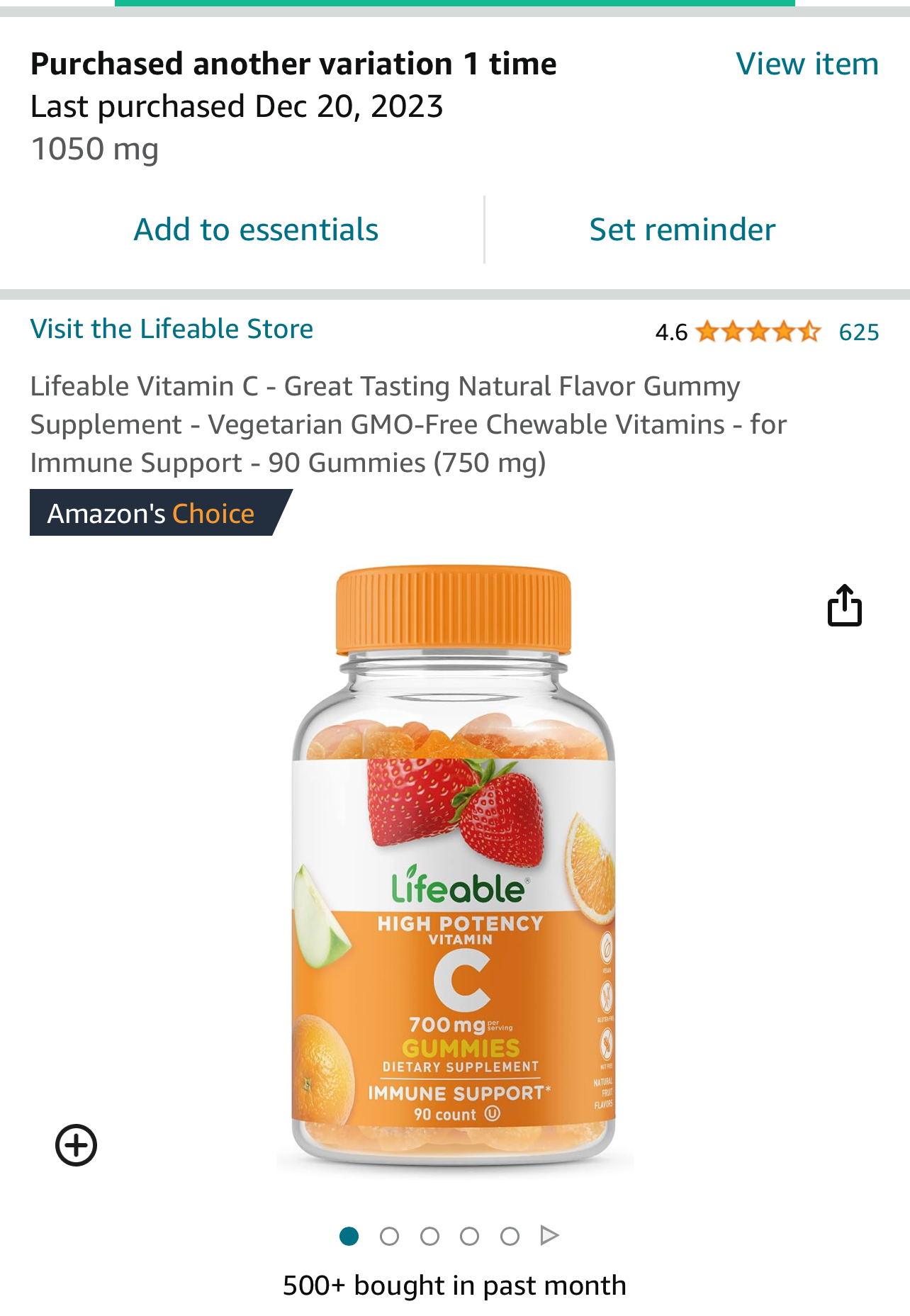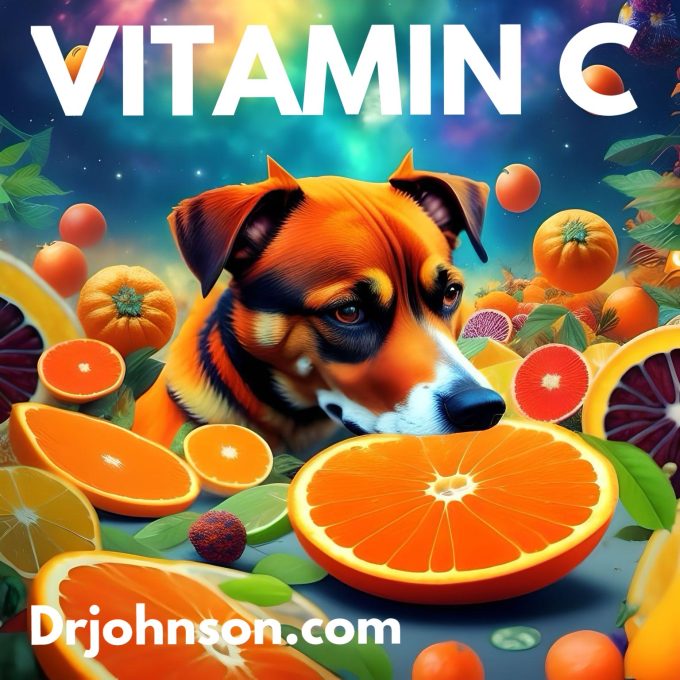Always learning, there’s more to know about Vitamin C in canine patients. But here are the first three things to know:
- It’s cheap to give Vitamin C to dogs
- It’s safe to give Vitamin C to dogs
- It boosts the immune system when you give ascorbate (Vitamin C) to dogs.
How much should a dog take?
Answer: I like one gram by mouth once per day every day for a ten pound dog. So a sixty pound dog would get up to 6 grams a day.
Is Vitamin C “necessary” in dogs?
No it’s not. A dog can make / synthesize it’s own vitamin C to live a full life. Hyper supplementation is powerfully anti-oxidant and is shown (in many animals) to potentiate the immune system of dogs, fish and humans.
What forms do they like or dislike?
Dogs don’t much like the powdered version, or even the “tart” flavored ascorbate tablets. Dogs are OFTEN “fine” with Vitamin C gummies and or chews if you touch them with peanut butter or another ‘coating’ like a pill-pocket. Dogs don’t like tart flavors.
What would be a “maximum” dose?
I don’t know. Maybe there isn’t one.
Linus Pauling was a fan of hyper-supplementation of Vitamin C in humans. He fought with the usRDA scientists about the “dose” of vitamin C
These scientists were “hung up” on the fact that the body had lower needs for vitamin C than Pauling was endorsing. Also, the body could only “process” a specific, low amount of vitamin C in the diet. And the usRDA scientists mocked Pauling for not understanding this.
Pauling said they were UTTERLY missing the point. He believed that the high levels of ascorbate / vitamin C in the tissues were providing a VERY “antioxidant marinade” for the cells and in the interstitial space (the juicy areas of the body BETWEEN the cells.)
He (Pauling) believed that by saturating the tissues in “antioxidants” was healthful, detoxifying, naturalizing and healing to cells. And he’s been right so far.
Most of the time, when something comes down the pike that’s “great” and healthful, it’s really the antioxidant / cellular metbolism-supporters that are of the greatest benefit.
Glutathione for example, is an important messenger in the body and provides natural antioxidant support for the body. Some scientists say that for inflammation, “Glutathione” is superior to prednisone. Which is indubitably true. HOWEVER glutathione doesn’t directly stabilize lysozomal membranes and so it is only a “one-trick pony” in certain oxidative / inflammatory lesions.
Synthesis, stabilization and administration of Glutathione has so fr been problematic especially since the half life of intravenous glutathione is measured in minutes.
It would be nice to find a powerful antioxidant that can “bathe” tissues for an extended period of time, safely.
Enter: Vitamin C.
Vitamin C supplementation does:
- Amplify the immune system and disease resistance
- Speed healing of the skin especially when fibrin deposition and collagen are needed
- Enhance if not precipitate calcium deposition in the bones (increasing bone density)
- Speed healing overall in more tissues than just skin
- Reduce oxidative damage in re-perfusion injuries in major organs like lliver and kidney. These are purely antioxidant benefits and impacts.
https://amzn.to/3Hk8wVA This is a pricey human-grade chewable vitamin C some of my clients are using. I admire it highly for palatability and formulation.
https://amzn.to/3tIRy09 This is a very good chewable that’s berry flavored with the benefits of Vitamin B. (I don’t care too much about the Vitamin B piece.) Each gummy is 250mg and so a ten pound dog would get 3 or 4 of them a day.
The following ( https://amzn.to/4aXuUBE ) is the chewable I personally use in smaller dogs giving 3 to 4 of these once a day. They, too are berry flavored and “pretty well accepted.”

I don’t subscribe to the idea of “perfectly healthy dogs” needing any of this. I am recommending it to my clients with older dogs and dogs with chronic illnesses that could benefit by effective, safe and inexpensive antioxidant therapies.
Facebook groups have taken it to the next level assuring readers that pets will learn Portuguese in 3 or fewer days, on Vitamin C
One Facebook Group, with a dog breeder and a retired Doctor (of Spanish Literature (The highly esteemed science-community around Millsaps.edu), have determined that Vitamin C supplementation will cure every single neurological disorder presented to them in their armchair veterinary practices from behind their keyboards.
Another Facebook group has shown conclusively in their writing (not their reading or research) that vitamin C supplementation is curative for bleeding disorders, fleas, ear infections and foot licking and replaces any and all recommendations made by your dumb Western Veterinarians except “Dr Marty the Dogfood Salesman”.
“Dr Marty the Dogfood Salesman”. He’s America’s Favorite Vet, and sells an expensive dogfood*. It’s conceivable he knows a few facts about veterinary medicine (probably flea control) but there’s no way to tell since he works under his first name (So cutesie) which deprives the lay person of the ability to look at his license or other credentials. This is a very good move for that particular veterinarian who would like to remain authoritative as a veterinarian, and not just as a smarmy dogfood purveyor.
*Dr Marty’s dog food is a modern miracle. It can provide benefits to every known disease or condition in dogs! Look at this impressive list of things it cures!
Dr Marty’s dog food, plus a non-steroidal anti-inflammatory, can improve or even ameliorate arthritis discomfort.”
“Dr Marty’s dogfood given with steroids has a marked beneficial effect on Auto-Immune-Hemolytic Anemia.”
”Dr Marty’s dogfood used with bandages can stop bleeding in superficial cuts and lacerations in dogs in mere minutes.”
“Dr Marty’s dog food plus 6 weeks of time with internal or external fxation can resolve a fracture in the midshaft of the tibia.
Researchers found that combining stitches with Dr Marty’s dog food can close a wound post operatively in minutes.
“Dr Marty’s dog food is an amazing food, curing arthritis, full thickness wounds, profuse bleeding, causes bone healing, even stops auto-immune disorders. Never mind the fine print above.”






